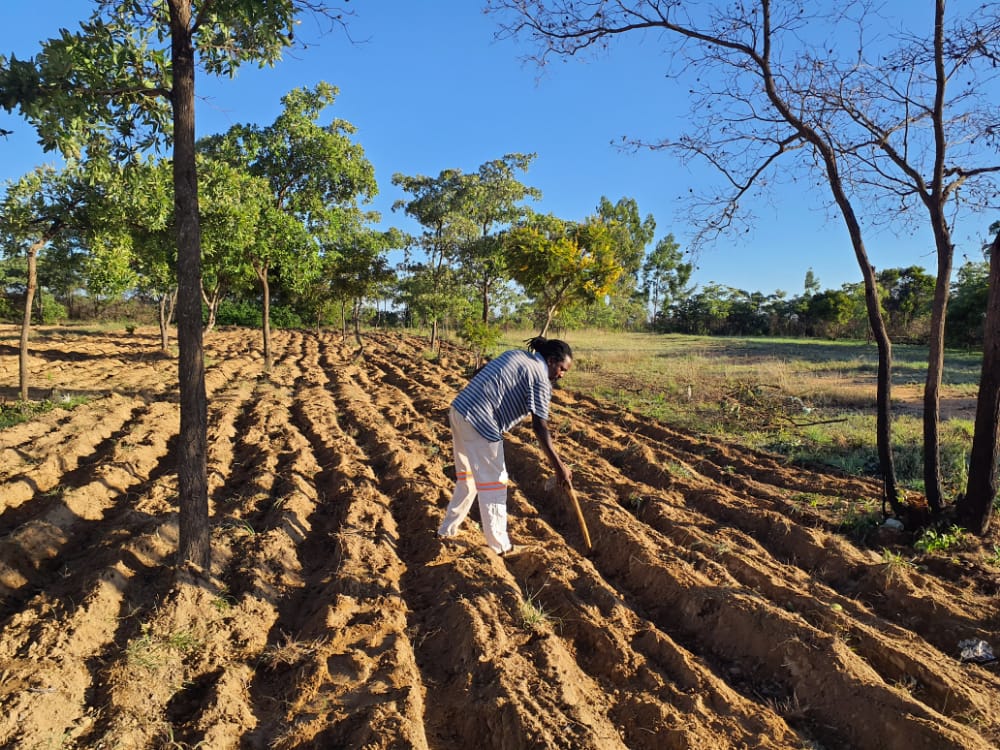
My name is Robert Simbanegavi. I’m from Simbanegavi Village, Gutu District. I am 36 years old. l used to grow crops using synthetic fertilizers and hybrid seeds which costs me a lot of money because I was facing challenges of failing to raise enough capital to purchase these inputs. The harvest l got from growing hybrid seeds using synthetic fertilizers was not that good, the yields did not increase during the 2 years l started using these inputs. So l started looking for alternative ways of growing crops which required less money and l was glad to learn that my neighbours were receiving training on agroecology.
I joined them and received my training on agroecology at our chief’s homestead on 18th of August 2020 at Mupata Village in Ward 22. The training was organised by Zimbabwe Smallholder Organic Farmer’s Forum Facilitator, Onias Mauramba.
Because I wanted to move away from any kind of farming that required a lot of money, l benefited a lot on the growing of a variety of small grains (such as sorghum , finger millet and rapoko) and pulses such as cowpeas, groundnuts etc. I also learnt that agroecology requires a lot of labour especially when one is starting but it is worth it because it brings high yields, improves soil fertility and it is environmental friendly. So the need for a lot of labour just to establish farming using agroecological practices was not my big worry.
I also benefited a lot of knowledge. Skills of agroecology helped me to know the dangers of applying synthetic fertilizers on my fields that they lead to poor soils, kills the soils and even expensive too. We use organic fertilizers which are locally available, and these improve soil quality, contain moisture and are also friendly to the environment. So I made the decision of using agroecological skills on my fields and this made me able to eat diverse foods in my house. Through growing small grains, I have gained a balanced diet. So many people in my area are attracted to agroecology. Before, people in my village took it for granted. But this changed, after they saw that my yields were increasing. Most of the farmers in the area are now interested in it and are applying all the skills of agroecology on their farm.
I am happy that farmers in my area now know and appreciate a better way of living, and are increasing crop production. Our soils too are showing good signs of change and l believe that they will become more suitable for farming many more years to come. It is indeed a big change for me because l used to destroy the soil using chemicals.
My advice to my community is that I encourage farmers to focus on agroecology rather than conventional agriculture because conventional agriculture destroys the soil, it is expensive and it’s not environmental friendly. I also urge farmers to rely on agroecological skills since it is cheap to handle and we make use of resources – be it seeds, manure, etc- which are locally available. In addition to that I just want to tell farmers that conventional agriculture might cause hunger due to poor harvests. The use of chemical fertilizers have a high risk and dangers to the health of farmers. They also lead to broken ecosystems and infertile soils. Benefits of agroecology is that it brings a more thoughtful, more holistic, more natural way of farming, working with nature not against it. Agroecological training has enabled me to improve my production of maize, sorghum, finger millet, groundnuts, rapoko, and many other traditional crops.
Agroecology brings the soil back to life.
Agroecology has changed how l look at and do farming.
